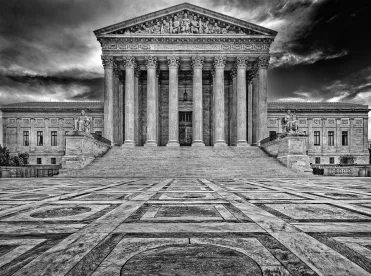In its first insider trading decision in nearly two decades, the US Supreme Court ruled unanimously to uphold an insider trading conviction of an individual (tippee) who traded while aware of material non-public information (MNPI) received from a friend (tipper) who did not receive a financial benefit for providing the tip. Salman v. United States, No. 15-628, 2016 WL 7078448 (U.S. Dec. 6, 2016). The ruling, written by Justice Samuel Alito, settles a split of authority between the US Court of Appeals for the Second and Ninth Circuits regarding whether a tipper receives a “personal benefit” for purposes of establishing insider trading liability by simply conveying MNPI to a family member or friend.
The defendant in the case, Bassam Salman, had been convicted for trading on MNPI regarding pending mergers and acquisitions he learned from his friend, Michael Kara. Mr. Kara was tipped off by his brother, Maher Kara, an investment banker and also Mr. Salman’s future brother‑in‑law. Mr. Salman had argued that he was wrongfully convicted because Mr. Maher did not receive money or anything else of tangible value for passing along the MNPI. In doing so, Mr. Salman had relied upon the Second Circuit’s landmark Newman decision, which held that a personal benefit may not be inferred from a personal relationship between the tipper and tippee, absent “proof of a meaningfully close personal relationship that generates an exchange that is objective, consequential and represents at least a potential gain of a pecuniary or similarly valuable nature.” United States v. Newman, 773 F.3d 438, 452 (2d Cir. 2014). The Second Circuit determined that such a finding “requires evidence of ‘a relationship between the insider and the recipient that suggests a quid pro quo from the latter, or an intention to benefit the [latter].’” Id. The Ninth Circuit, in upholding Mr. Salman’s jury conviction, had rejected the Second Circuit’s position, finding that the unlawful insider trading element of breach of fiduciary duty is met where an “insider makes a gift of confidential information to a trading relative or friend,” as stated by the Court in its 1983 decision in Dirks v. SEC. 463 U.S. 646, 664 (1983).
In its Salman opinion, the Court agreed with the Ninth Circuit and reiterated the position it established in Dirks. The Court stated that Dirks is clear—a breach of fiduciary duty occurs when a tipper discloses information for a personal benefit and a personal benefit may be inferred where confidential information is gifted to a “trading relative or friend.” According to the Court, Mr. Maher disclosed MNPI to Mr. Kara with the expectation that he would trade on it, and Mr. Kara shared the information with Mr. Salman, who knew that the information had been improperly disclosed. Mr. Salman assumed Mr. Maher’s fiduciary duties and breached those duties when he traded on the information. The Court rejected the Newman test in holding that the government need not show that tippers received a concrete benefit for their tips if they are giving information to a relative or friend. “Making a gift of inside information to a relative . . . is little different from trading on the information, obtaining the profits and doling them out to the trading relative. The tipper benefits either way,” stated Justice Alito.
Clearly, the Salman holding will lower the evidentiary burden on the Government to prosecute insider trading cases involving friends or relatives. With this in mind, corporate compliance personnel should re-emphasize to insiders that they must remain vigilant in safeguarding MNPI in their communications with friends and family members.







 />i
/>i
